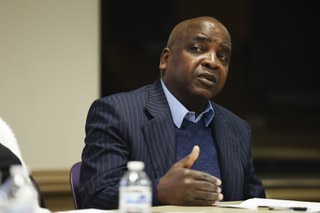
Malinda Southard with Division of Health Care Financing and Policy speaks during a health care roundtable discussion at Alexander Library Wednesday, Jan. 10, 2024.
Friday, Jan. 12, 2024 | 2 a.m.
Combating the opioid epidemic and increasing health care access to at-risk communities are priorities for Southern Nevada’s health organizations in 2024, officials detailed this week.
“Just because we’re making sure that these resources are available, doesn’t mean that people actually have access to them,” said Ireti Fawehinmi, a community health work manager at Immunize Nevada, during a discussion on valley health needs at Alexander Library in North Las Vegas.
“Giving people the opportunity to make informed decisions that they need for themselves and their families are some of our major priorities this year,” she continued.
The discussion focused on the region’s health care priorities, threats and projects for the new year. Katie Charleson from Nevada Health Link, Malinda Southard at the Division of Health Care Financing and Policy, and Fermin Leguen from the Southern Nevada Health District were among those who participated.
Access to resources, especially for low-income families and undocumented residents, dominated the talk.
Fawehinmi dived into some of the mistrust in the health industry that underserved communities may have, which she said Immunize Nevada has partially remedied by hiring a diverse staff that could connect with community members.
Spreading health information was made easier through that, as well as through their usual pop-up clinics among other events, she added.
Charleson, the communications manager for Nevada Health Link, added that many of these underserved communities “have been affected greatly” by other aspects like Nevada’s health care policies.
“We have such a diverse state as far as just access, and rural is so different from our cities — and we’re huge — so it’s very hard to make sure every single person has access — and I think we’re all working toward that,” Charleson said.
Leguen wants the health district to continue partnering with local organizations to expand their work in the refugee community, which he called a “very sensitive area here in Nevada.”
For instance, the Nevada Health Link recently launched the Tribal Sponsorship Program, which it is trying to make statewide in the next few months, to help rural and Native American communities. The program will help pay the cost of health insurance premiums and out-of-pocket medical expenses for tribal members who qualify to enroll in a Qualified Health Plan through Nevada Health Link.
Opioid battle ongoing
Leguen said “one of the biggest threats” for Nevada was the opioid epidemic, with an increasing death toll made worse recently by synthetics like fentanyl and xylazine, an sedative commonly used on large animals.
In Clark County, about 22 people per 100,000 residents died from a drug and opioid-involved overdose between 2018 and 2020, officials said.
Nationally, more than 1 million people have died since 1999 from a drug overdose, and almost 645,000 of those were from an opioid overdose, according to the Centers for Disease Control and Prevention. And 75% of the 80,000 drug overdose deaths in 2021 alone involved an opioid, a number 10 times higher than those in 1999.
“The opioid epidemic is one of the biggest issues that’s hitting our community,” Leguen said. “We are losing hundreds of young people every year and it’s increasing by the year. That’s really huge.”
Southern Nevada has taken steps to combat the epidemic, like establishing the Southern Nevada Opioid Advisory Council in 2016, which was organized to “develop systems-level response … through evidence-based strategies and unique community collaborations.”
Last year, Clark County also established a 15-member Regional Opioid Task Force, a product of Assembly Bill 132 that was passed during the 2023 legislative session.
Last April, the Biden administration designated “tranq” — fentanyl combined with xylazine — as an emerging threat to the United States, and U.S. Sen. Catherine Cortez Masto, D-Nev., pushed lawmakers to regulate the drug through the Combating Illicit Xylazine Act.
The bill, which criminalizes the illicit use of xylazine, was introduced last March. There’s been no movement on the bill.

